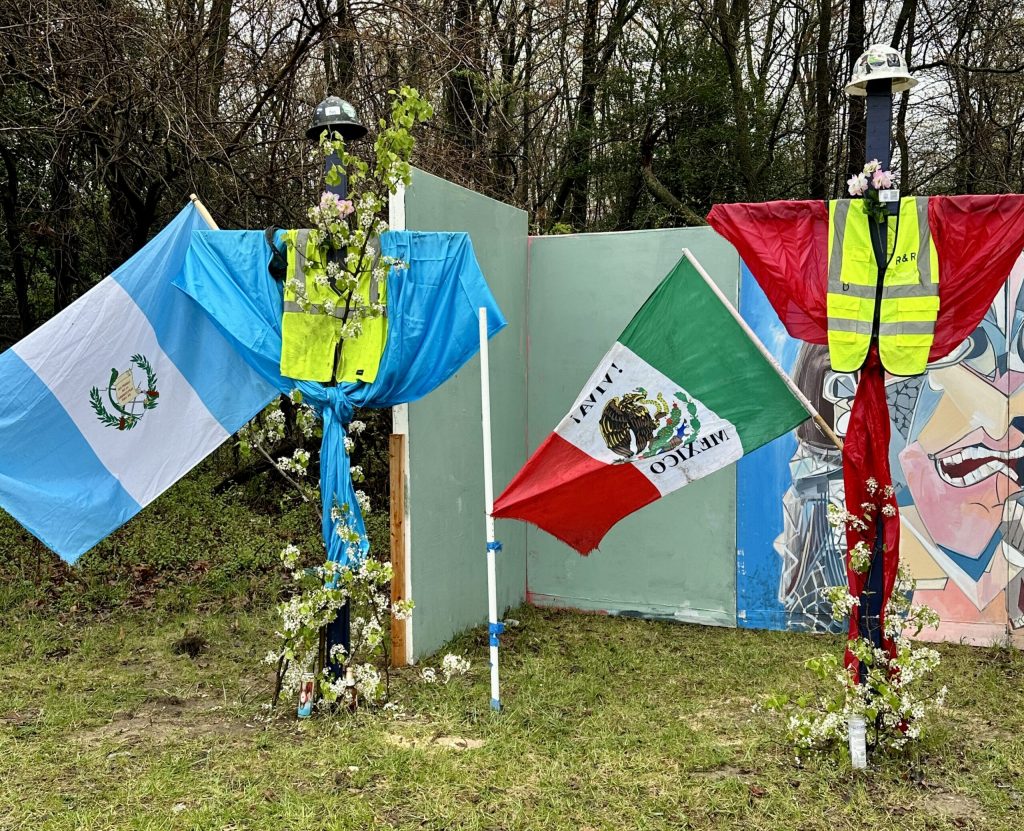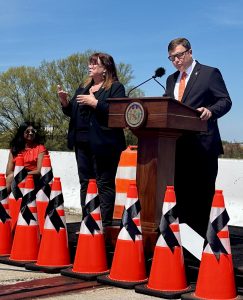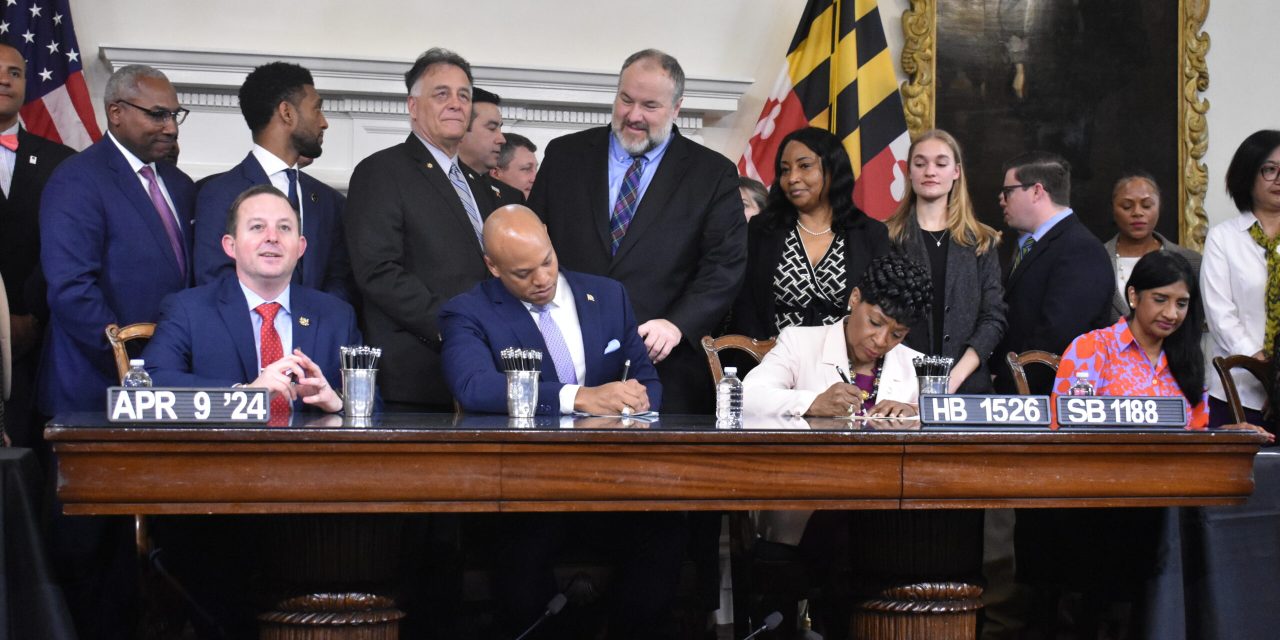By SAPNA BANSIL
Capital News Service
ANNAPOLIS – After a pair of deadly work zone incidents cast attention on the dangers of road work, Gov. Wes Moore enacted a set of protections for workers and their families that his administration describes as “a moral imperative.”
Hours after the state’s legislature adjourned, a bill increasing fines for work zone speed violations and another covering educational costs for families of fallen workers were among the first measures from the 2024 session that Moore signed into law.
At a bill signing ceremony, Lt. Gov. Aruna Miller, a former transportation engineer, invoked two fatal crashes that inspired the new legislation. In March 2023, six highway workers died when a car careened into a work zone on Interstate 695. Nearly a year later, six construction workers repairing potholes atop the Francis Scott Key Bridge were killed when a container ship struck the bridge, causing it to collapse.
“The men and women in the construction industry place themselves in harm’s way every day on the frontline of service,” Miller said. “We saw it happen on March 22, 2023. And we saw it happen again on March 26, 2024. It’s a moral imperative that we protect workers who provide critical service, public service for all of us.”
Among the measures to receive Moore’s signature was the Maryland Road Worker Protection Act, which Miller championed throughout the legislative session and touted Tuesday, during an event overlooking the site of the I-695 crash to mark National Work Zone Awareness Week.
Effective June 1, the new law permits the installation of multiple speed cameras within a single work zone and raises the fine for speed camera violations to $80. The current penalty in Maryland is $40, among the lowest such fines in the country.
Beginning January 2025, fines shift to a tiered system ranging from $60 to $500 depending on the driver’s speed. Fines will double if workers are present at the time of the violation.
While the law is viewed as a direct response to the I-695 crash, officials said it also acknowledges the dangers that road workers experience every day. In 2023, there were 1,287 work zone crashes across Maryland, an average of 3.5 per day.
Steven Cook, a field maintenance technician with the Maryland Department of Transportation who attended Tuesday’s event, said highway work requires constant vigilance. He has witnessed drivers who ignore signs, take out traffic cones and slip into work zones. “It happens more often than what people really think about and notice,” Cook told Capital News Service.
“You always got to have your head on a swivel with being out here on the highway … We’re sitting ducks when we’re out here on the job,” Cook added.
The new law is part of a larger effort to change driver behavior in work zones by strengthening enforcement methods and increasing education. Distracted driving, aggressive driving and speeding are the leading causes of work zone crashes, according to the State Highway Administration.

A memorial on Fort Armistead Road in Baltimore, seen here on April 2, 2024, commemorates six immigrant construction workers who died when the Francis Scott Key Bridge collapsed on March 26, 2024. (Sapna Bansil/Capital News Service)
“Most crashes are not accidents,” State Highway Administrator William Pines told Capital News Service. “In reality, they’re very preventable. The majority of crashes that occur happen because of behaviors with drivers. So if we want to stop the root cause of most crashes, we’ve got to deal with driver behavior.”
But the law offers no safety solutions for incidents like the collapse of the Key Bridge, which was unrelated to driver behavior. Maryland Transportation Secretary Paul Wiedefeld told Capital News Service on Tuesday that officials may consider structural solutions to bolster bridge safety but are awaiting the results of an investigation by the National Transportation Safety Board before making any specific policy proposals.
Instead, lawmakers responded to the bridge collapse by recognizing the toll that work zone crashes leave on workers’ families.
In the final hours of the legislative session, the General Assembly passed the Protecting Opportunities and Regional Trade (PORT) Act, primarily aimed at providing emergency aid to workers and businesses affected by the closure of the Port of Baltimore. Moore’s administration offered a successful amendment to the bill creating the Fallen Transportation Workers Scholarship Program, providing tuition assistance for five years of full-time study or eight years of part-time study to children and spouses of workers who have died on the job since 2022.
“What happened on the bridge is horrifically traumatic, and I think one of the things that we wanted to do is protect others who are in a similarly dangerous situation,” said Maryland Senate President Bill Ferguson, D-Baltimore City, who co-sponsored the PORT Act.
“Certainly, we wish there were no one participating in that fund, but sadly, we know how dangerous this work is,” he continued.

State Highway Administrator William Pines (right) speaks on April 16, 2024, at an event in Woodlawn marking National Work Zone Awareness Week. The event was held on an overpass near the site of a 2023 crash that killed six road workers. (Sapna Bansil/Capital News Service)
The scholarship reflected efforts by the state’s Latino Caucus, which met with members of Moore’s administration in the days after the bridge collapse and sought financial support for the families of the victims. The six men who died were all immigrant construction workers from Latin America. Three of the workers killed in the I-695 crash were also of Latino origin.
“When someone passes, particularly as the breadwinner or primary breadwinner of their family, it trickles down,” said Del. Ashanti Martinez, D-Prince George’s, chair of the Latino Caucus. “It’s not just about their immediate family, but those that they support in the community or back home.”
Del. Deni Taveras, D-Prince George’s, a member of the caucus’ executive board, said she was pleased to see the scholarship included in the PORT Act but expressed concern about how families would meet immediate needs for rent, food and clothing.
“Something is definitely better than nothing,” Taveras said. “I’m happy that they can have a secure future for themselves through access to college.”
Another executive board member, Del. Joe Vogel, D-Montgomery, said he hopes the state will continue to acknowledge the workers’ sacrifices and support their families’ needs over the long term.
“I want the families to feel like the lives lost were not in vain and that the state appreciates and recognizes the immense value of those six individuals,” Vogel said.
Beyond the legislative remedies, state officials have called the two work zone tragedies an opportunity for awareness. They’ve said the workers’ deaths, as well as countless other close calls that happen each day, are a reminder that road workers take on labor that is essential and difficult but also overlooked. And that many are sacrificing their lives to do so.
“Our work zones are filled with mothers, fathers, sisters, brothers, close friends and your neighbors,” Pines said, standing atop an overpass for Tuesday’s National Work Zone Awareness Week event as cars and trucks zipped underneath. “They’re building a better, safer, world-class highway system to provide access and opportunity to every single user. The highway is their office. Protecting them must be a priority for us.”
Angelique Gingras contributed reporting for this story.




Recent Comments